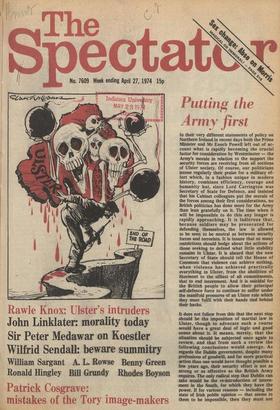Putting the Army first
In their very different statements of policy on Northern Ireland in recent days both the Prime Minister and Mr Enoch Powell left out of account what is rapidly becoming the crucial factor for consideration by Westminster — the Army's morale in relation tn the support the security forces are receiving from all sections of Ulster society. Of course, our politicians intone regularly their praise for a military effort which, in a fashion unique in modern history, combines efficiency, courage and humanity but, since Lord Carrington was Secretary of State for Defence, and insisted that his Cabinet colleagues put the morale of the forces among their first considerations, no British politician has done more for the Army than lean gratefully on it. The time when it will be impossible to do this any longer is rapidly approaching. It is ludicrous that, because soldiers may be prosecuted for defending themselves, the law is allowed_ to be seen to be neutral as between security forces and terrorists. It is insane that so many restrictions should hedge about the actions of those seeking to defend what little stability remains in Ulster. It is absurd that the new Secretary of State should tell the House of Commons that violence can achieve nothing, when violence has achieved practically everything in Ulster, from the abolition of Stormont to the silliest of all commitments, that to end internment. And it is suicidal for the British people to allow their principal self-defence force to continue to suffer under the manifold pressures of an Ulster role which they must fulfil with their hands tied behind their backs.
It does not follow from this that the next step should be the imposition of martial law in Ulster, though to advocate such a course would have a great deal of logic and good sense about it. It means, merely, that the situation should be subjected once again to review, and that from such a review the following conclusions would emerge. As regards the Dublin government, despite many professions of goodwill, and far more practical action than one would have thought possible a few years ago, their security effort is not as strong or as effective as the British Army requires. The only radical step that Dublin can take would be the re-introduction of internment in the South, for which they have the power. If for various reasons — including the state of Irish public opinion — that seems to them to be impossible, then they must not complain if, in the fairly near future, Britain decides that her interests are best served by withdrawing the Army. As regards the socalled Loyalist movement their leaders must divorce themselves as clearly and as openly from Protestant terrorism as Mr Fitt has divorced himself from Catholic terrorism, and their devotion to the Loyalist cause must be expressed in true loyalty rather than multiple division. (It is surprising, incidentally, that Mr Powell, whose policy on integration has been clear throughout, should contemplate allying himself with a coalition only one element in which believes in that policy.) And as regards all parties and groups in Ulster they must take a clear stand against terrorism and in support of the security forces, without cavil, reservation or ambiguity.
Unless all these conditions are fulfilled — and it is by no means clear that British politicians see the necessity for them — we are measurably closer to a military withdrawal from Ulster under pressure. If that had to happen there would be only one method of practically organising it from the point of view of London. Westminster would have to wash its hands of the whole Irish problem, and that action would be followed by a unilateral declaration of independence from Belfast. Once these two actions are taken, the Dublin government, unless it wanted to embark on a wasting civil war, would be best advised to declare its own independence, and to remain quiet until happier times offered the prospect of an alliance with Belfast. All this would be melancholy, but the protection of our Army now becomes the first charge on Westminster.
France at the polls
The difficulties, rather more than the advantages of the constitutional system of Francw as bequeathed to the country by General de Gaulle, are going to become very apparent over the next few weeks, if the present trends m political opinion polling on the presidential election continue. At the time of writing Giscard d'Estaing is running just ahead of Mitterand and Chaban-Delmas, though the latter two would be equal if the Finance Minister were not in the race. The election, however, takes place in two stages, the second being a run-off between the top two contenders, assuming nobody has achieved more than 50 per cent of the total vote in the first Giscard d'Estaing is thus the present favourite, though a victory would leave him entrenched as President but relying totally on the support of what would then be embittered Gaullists. If Mitterand won he says he would call new elections and, conceivably, the country would then give his left-wing alliance a parliamentary as well as a Presidential mandate: no such option is open to Giscard d'Estaing the leader of the relatively tiny Independent Republican Party. Thus, if Giscard d'Estaing is the eventual winner the power of the Presidency is bound to be sharply reduced even if a major constitutional crisis is not provoked by the disgruntled followers of Chaban-Delmas. Now, it is essentially thu power of the Presidency — though there were complaints about the authoritarianism of both the General and M. Pompidou — that has preserved the stability of French politics for fourteen or more years: once it comes under threat the way is open for a return to the chaos of the 'fifties. The French electorate ought to think very carefully before awarding the mandate to anybody but Chaban-Delmas.



































